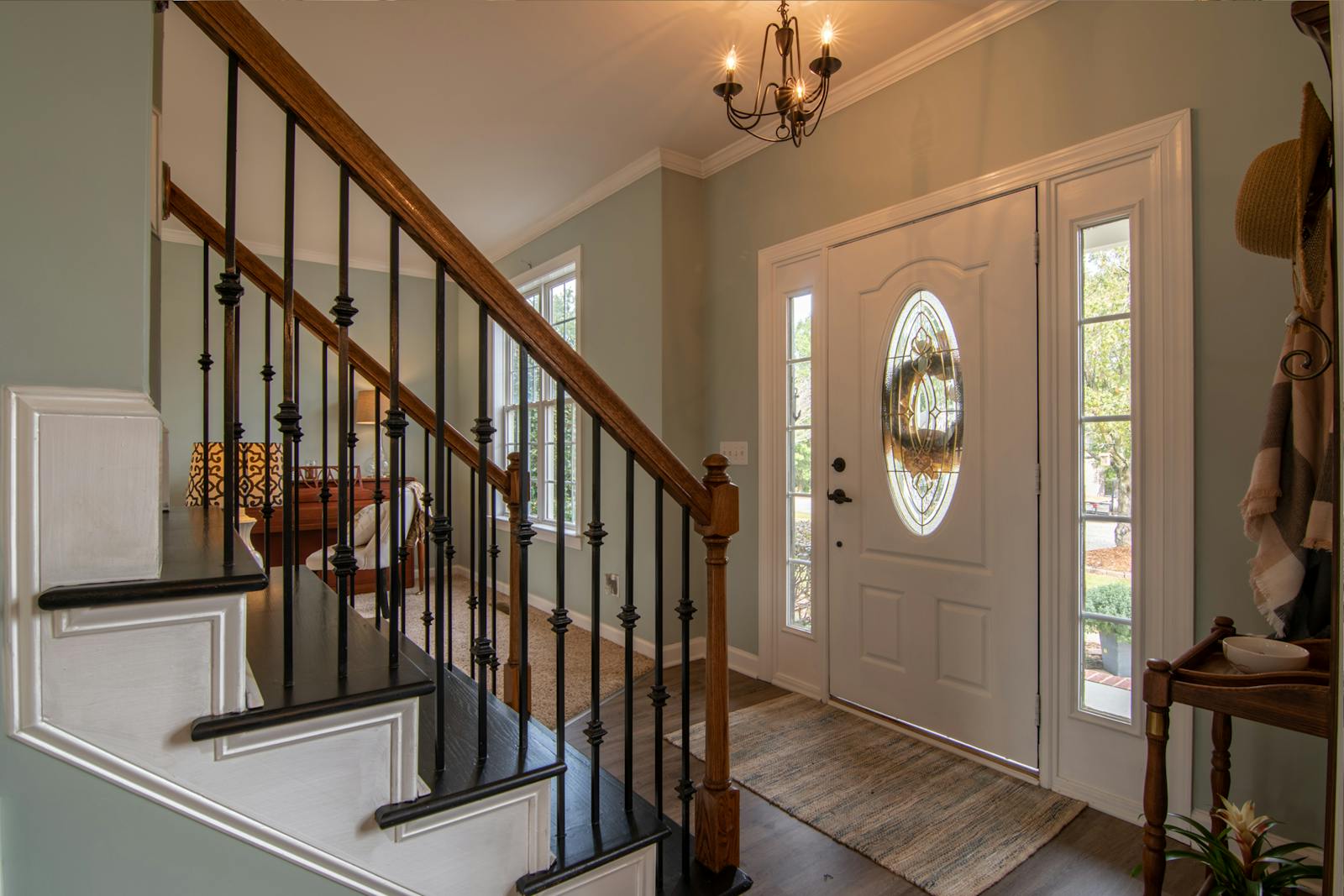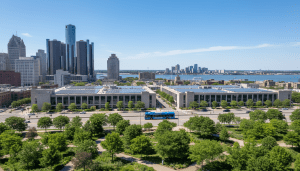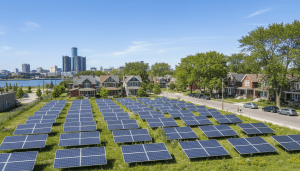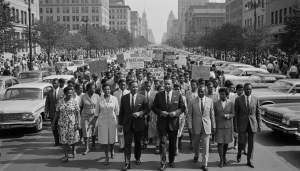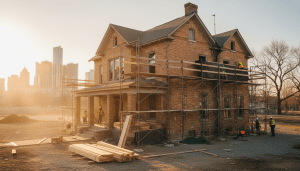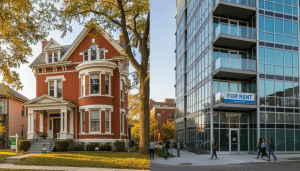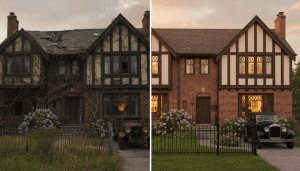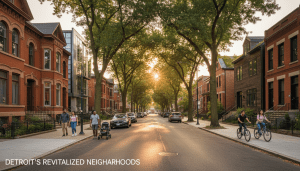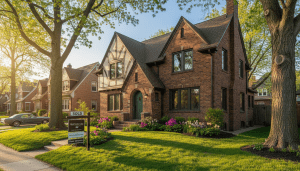Detroit Commercial Real Estate Trends 2025 are signaling one thing: this is a market on the move. The Motor City’s commercial property sector is in the midst of transformation — from new office builds and mixed-use projects downtown to industrial parks powering the EV revolution.
Whether you’re a broker, investor, developer, or business owner, understanding what’s happening in Detroit’s CRE (Commercial Real Estate) market in 2025 is essential. This in-depth guide breaks down leasing trends, vacancy rates, hot neighborhoods, development pipelines, and investment opportunities across office, retail, hospitality, and industrial sectors.
Why 2025 Is a Turning Point for Detroit Commercial Real Estate
Detroit has been laying the groundwork for years, but 2025 is where the pieces start coming together.
Office market resilience: After pandemic-era challenges, office occupancy downtown is climbing, driven by hybrid models that value collaborative space.
Retail revival: District Detroit and Midtown corridors are attracting national tenants and boutique operators alike.
Industrial boom: With Ford, GM, and Stellantis retooling plants for EV production, demand for warehouses and logistics space is outpacing supply.
Tourism & hospitality: New hotel projects are coming online to meet rising visitor numbers, creating opportunities for food, beverage, and entertainment ventures.
Detroit’s CRE story is no longer a “turnaround” tale — it’s a growth story backed by billions in investment and an increasingly diverse economy.
Office Market Trends: Hybrid-Ready Spaces
Downtown & Midtown Office Demand
Downtown Detroit’s office market is experiencing a measured recovery:
Vacancy rates: Trending downward from pandemic highs, with Class A space leading absorption.
Hybrid demand: Companies want flexible space — shared collaboration areas, smaller private offices, and tech-enabled meeting rooms.
Adaptive reuse: Historic buildings like the Book Tower and Hudson’s site have been converted into mixed-use hubs with premium office components.
💡 Investor Insight: Expect continued demand for small-to-mid-size office suites (5,000–15,000 sq. ft.) with flexible lease terms.
Suburban & Fringe Markets
The suburban office market remains stable, but younger workforces prefer transit-accessible urban cores. Developers are focusing on transit-oriented nodes connected to the QLine and future mobility corridors.
Retail Trends: Experience-Driven Leasing
Retail is not dead — it’s evolving.
Food & beverage anchors: Breweries, chef-driven restaurants, and experiential dining are filling prime downtown spaces.
Boutique retail: Detroit-made brands are thriving, with strong foot traffic near Campus Martius and Woodward Avenue.
Pop-ups & seasonal markets: Flexible retail leases are letting small businesses test concepts before committing long term.
District Detroit & Neighborhood Corridors
District Detroit: Anchored by Little Caesars Arena, this mixed-use district is expanding with new residential units, retail, and hospitality, making it a prime investment zone.
Midtown & New Center: Growing student and young professional populations are driving demand for cafés, co-working cafés, and boutique shops.
Corktown: Restaurant and nightlife growth is spilling over from Michigan Central, attracting both locals and tourists.
Industrial & Logistics: The EV Effect
Industrial real estate is Detroit’s hottest CRE segment in 2025.
EV manufacturing: Ford’s Michigan Central and GM’s Factory ZERO continue to ramp production, spurring supplier demand for industrial space.
Warehouse & distribution hubs: Locations near I-94, I-75, and Detroit Metropolitan Airport are commanding premium lease rates.
Speculative builds: Developers are breaking ground on spec warehouses to meet demand from logistics, e-commerce, and last-mile delivery players.
💡 Developer Tip: Consider brownfield redevelopment opportunities — tax credits can make formerly underutilized land highly profitable.
Hospitality & Mixed-Use Developments
Detroit’s tourism surge is fueling new hotel construction:
Boutique hotels: Shinola Hotel set the tone; now more independent brands are entering the market.
National chains: Marriott and Hilton expansions add business travel capacity.
Mixed-use: Projects like Hudson’s Detroit blend residential, office, retail, and hospitality, keeping downtown vibrant 24/7.
Key Development Projects to Watch in 2025
Hudson’s Detroit: Opening phases add office, retail, residential, and observation deck space.
District Detroit Expansion: More than 1M sq. ft. of mixed-use development under construction.
Joe Louis Greenway Adjacent Projects: Commercial nodes planned along trail segments, catering to cyclists and pedestrians.
Michigan Central Campus: Full activation of mobility labs and public spaces, boosting surrounding property values.
Investment Opportunities in Detroit CRE
Who Should Be Looking
Institutional Investors: Target Class A office and large-scale industrial assets.
Private Investors: Look at retail strip centers, small warehouses, and adaptive reuse projects.
Developers: Mid-rise mixed-use buildings in Midtown and Corktown have strong absorption potential.
Financing & Incentives
Detroit offers multiple incentives:
Brownfield tax credits for redeveloping contaminated sites.
Historic preservation credits for restoring landmark buildings.
Opportunity Zones covering many high-growth neighborhoods.
Risks & Market Considerations
Interest rates: Higher borrowing costs could slow speculative development.
Construction costs: Inflation pressures remain, but some relief expected in late 2025.
Neighborhood disparity: Not all districts are recovering equally — pick your submarket carefully.
Strategic Takeaways
Focus on Mixed-Use: Projects combining office, retail, and residential remain resilient.
Prioritize Transit Access: Locations near QLine, bus hubs, or future greenway nodes will outperform.
Partner Locally: Work with Detroit-based brokers, architects, and community groups for smoother approvals and incentives.
Act Early: As demand continues rising, early movers lock in better pricing and lease terms.
The Bottom Line for 2025 CRE Investors
Detroit Commercial Real Estate Trends 2025 show a city maturing into a true 21st-century market. Office absorption is recovering, retail is rebounding, industrial demand is white-hot, and hospitality is surging. For investors willing to do their homework, Detroit offers a blend of strong yields and long-term upside.
